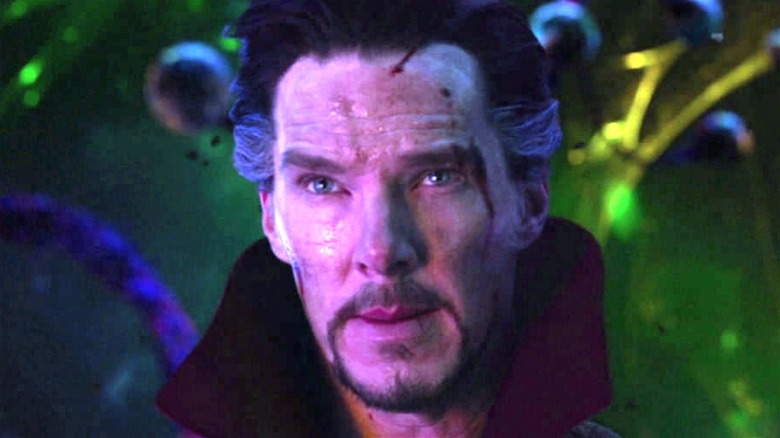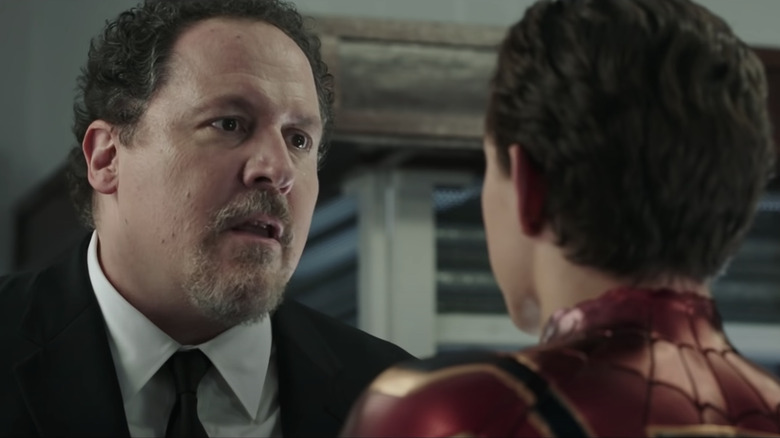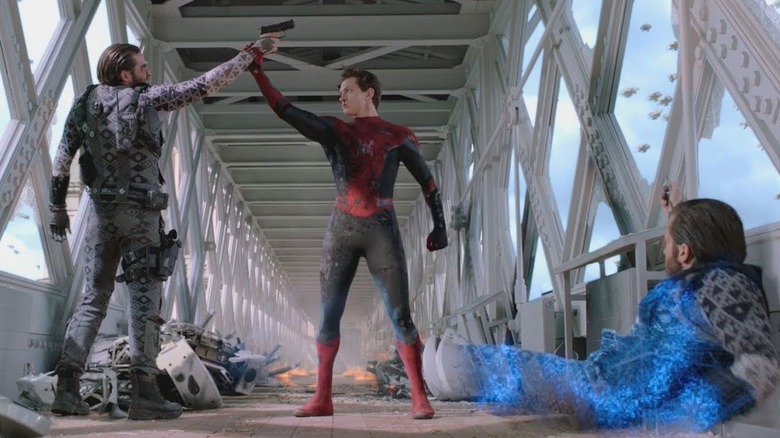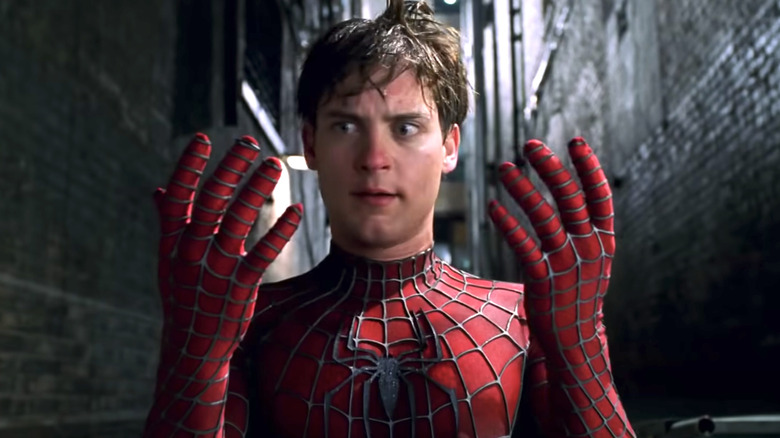It's Time To Talk About Doctor Strange's Spell In Spider-Man: No Way Home
Spoilers ahead from "Spider-Man: No Way Home"
When it comes to time travel, parallel universes, and magic, nothing really makes sense — which is why the ending of "Spider-Man: No Way Home" can be somewhat confusing. It somehow managed to mix all three of these dizzying plot elements together. In order to prevent a previously botched spell from summoning every person in the multiverse who knows that Peter Parker (Tom Holland) is Spider-Man, Doctor Strange (Benedict Cumberbatch) casts another spell that makes everyone in the multiverse forget that MCU Peter Parker ever existed.
This complicated series of events can be tough to wrap your head around as Peter interacts with those closest to him without them ever remembering who he is. In the end, Doctor Strange's spell in "No Way Home" only raised more questions, even as it resolved the multiverse-level catastrophe at hand. Thankfully, most of these questions can be explained once you think about how the spell could work.
How does Happy know Aunt May now that Peter is 'gone?'
One of the most glaring questions raised by the effects of Doctor Strange's spell is in how it influences Happy Hogan (Jon Favreau). A key ongoing subplot running throughout the first two Tom Holland "Spider-Man" films is Happy Hogan's budding relationship with Aunt May (Marisa Tomei). The long-time accomplice to Tony Stark (Robert Downey Jr.) meets May through Peter, and their relationship grows from there. Given Happy's ties to both Peter and May, at first glance, it doesn't make much sense that he would still remember her after Doctor Strange casts his spell at the end of "Spider-Man: No Way Home."
Peter runs into Happy while visiting May's grave after she is killed by the Green Goblin (Willem Dafoe). He doesn't recognize Peter, but he does briefly explain that he met May "through Spider-Man." Since Spider-Man still exists as a separate entity from Peter in everyone's minds, Happy would still have memories of working with a young superhero on Avengers missions. However, any inkling that that young superhero is the man he's talking to at the graveside is gone. This fact is also hammered home in J. Jonah Jameson's (J.K. Simmons) final rant, in which he explicitly asks for the now-unknown Spider-Man to reveal his true identity.
And so, even though the specialness of Happy's bond with Peter through their connection to May is gone, there is something nice about him retaining memories of the woman he loved — even if the details about who introduced them are a bit fuzzier.
What about the Mysterio video?
Some of the dialogue between Peter and Michelle Jones-Watson (Zendaya) near the end of "Spider-Man: No Way Home" indicates that it is possible for MJ, and presumably others, to remember Peter even after the spell. They only need to be reminded, something which Peter is too chicken to do in the film's conclusion. If that's the case, then wouldn't Mysterio's (Jake Gyllenhaal) video, which is broadcast at the end of "Spider-Man: Far From Home," simply remind everyone that Peter Parker both exists and that he is Spider-Man?
This is a question "No Way Home" never really addresses; it is left up to the viewer's imagination to fill in the gaps. Presumably, Doctor Strange's spell could have done a number of things to resolve this, including altering reality to change the video or blocking the true information from reaching people's minds when they watch it. In either case, it is assumed that the video is incapable of reminding the world of Peter Parker. Even so, there's probably a good amount of people who still believe that Spider-Man killed Mysterio, attracted the alternate-universe villains, and is actually a web-slinging menace.
Does the entire multiverse forget about every Peter?
In order for Doctor Strange's first spell (the spell that is supposed to make everyone but a few people forget Spider-Man's identity and instead brings both the alternate villains and the alternate Spider-Men into the picture) to work, it would have had to apply to every Peter Parker across the multiverse. The criteria for being brought over is simply that one must know Peter Parker is Spider-Man, and the reality-cracking multiversal invasion would have happened a lot sooner had Strange not contained the spell. This draws another question. If his second spell — which makes everyone in the universe forget Peter Parker's existence — can banish these invaders, doesn't that make the entire multiverse forget about every Peter Parker?
This is another matter which "No Way Home" doesn't directly address. Like Mysterio's tape, this explanation requires a bit of imagination since we don't know the specifics of the ex-Sorcerer Supreme's spellcasting. It's entirely possible that while the first spell applied to every Peter Parker in every timeline, the second only applies to the MCU's Peter. This way, the Raimi-verse and Webb-verse Peters (Tobey Maguire and Andrew Garfield, respectively) would still be remembered in their universes while also being sent home safe and sound. They would, however, forget about their adventure with MCU Peter.



